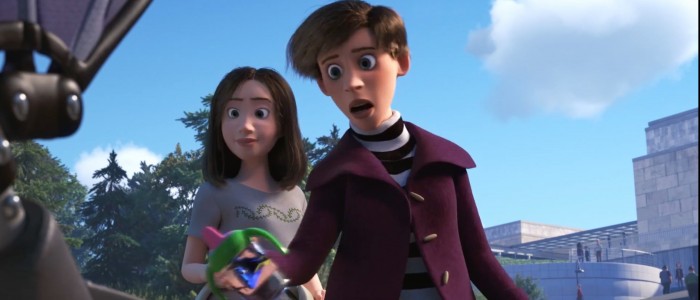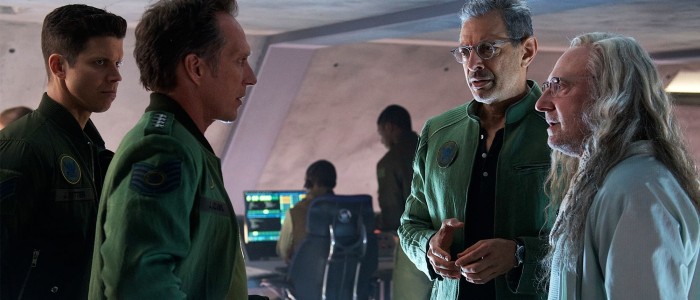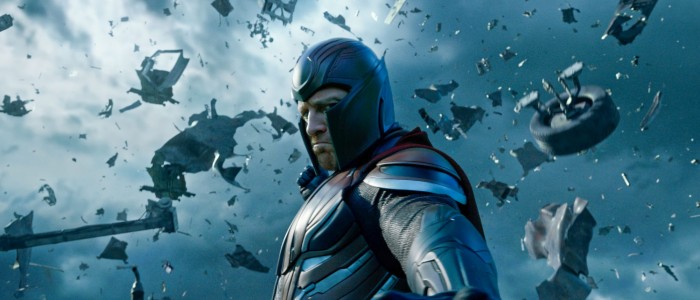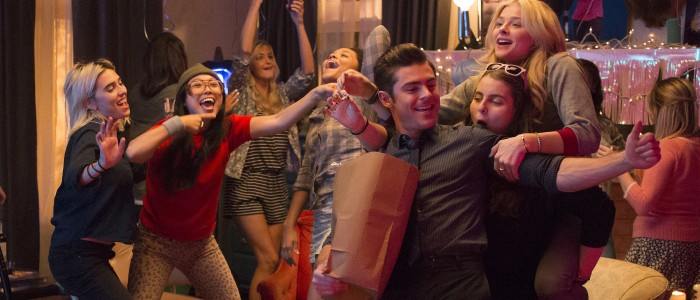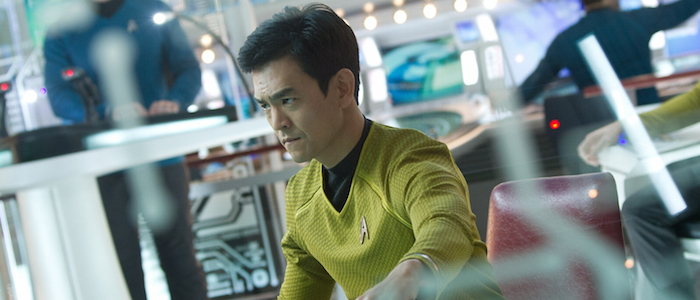'Ghostbusters' Jillian Holtzmann And The Not-Quite-Gay Characters Of Summer 2016
This summer has served up all sorts of expensive, extravagant spectacles. We've traveled to far-flung fantasy realms, battled ghouls and ghosts of every stripe, witnessed multiple animals endangering human lives by driving trucks, and cheered on more superhero-on-superhero pileups than you can shake a supernaturally powered scepter at. One thing we haven't gotten a lot of, though? LGBTQ characters. Instead, what we have seen are a number of characters like Ghostbusters' Jillian Holtzmann, who slink right up to the edge, but then stop just short of coming out.
"Whatever You Want Them to Be"
2016's latest maybe-gay character comes in Ghostbusters, and more specifically in the form of Jillian Holtzmann, played by Kate McKinnon. Her very first dialogue in the movie is a pickup line ("Come here often?") directed at Kristen Wiig's character, and she spends much of the movie making flirty eyes at Wiig and Melissa McCarthy. Many of the early critical reactions have noted McKinnon's magnetism.
Ladies, if you're even a one on the Kinsey scale, you'll leave Ghostbusters with a massive crush on Kate McKinnon.
— Jenni Miller (@msjennimiller) July 10, 2016
But the movie stops just short of confirming her orientation either way. And in a recent interview with Jen Yamato for The Daily Beast, Feig did the same.
I ask Feig: Is Holtzmann gay?
He pauses, smiling. "What do you think?"
I'd like to think yes, I say. He offers a grinning, silent nod. "I hate to be coy about it," he offers. "But when you're dealing with the studios and that kind of thing..." He shrugs apologetically.
"You know, Kate is who she is and I love the relationship between Kate and Melissa's characters," he says. "I think it's a very interesting, close relationship. If you know Kate at all she's this kind of pansexual beast where it's just like everybody who's around her falls in love with her and she's so loving to everybody she's around. I wanted to let that come out in this character."
Like the movie itself, Feig tiptoes just up to the edge of confirming Holtzmann is gay, but won't actually cross that line. "What do you think?" is a non-answer, not very unlike the one Finding Dory director Andrew Stanton and producer Lindsay Collins gave when asked about Finding Dory's possibly lesbian moms:
"They can be whatever you want them to be," said Stanton. "There's no right or wrong answer."
"We never asked them," added producer Lindsey Collins.
"We have not asked that of any of the couples in any of our shots in any of our movies," Stanton said.
Subtle Sexuality
Even when we did get an actual, confirmed gay couple this summer in Independence Day: Resurgence, their presentation was so subtle that personally, I did not realize they were a couple until the very end of the movie. Up until that point, it was obvious the characters had some kind of affection for one another but wasn't sure if they were colleagues or relatives or friends or what. Your mileage may vary; I've spoken with people who were unsure or unaware of the same-sex relationship in the film, as well as some others who said they picked up on it from its introduction. (If you were in the former group and are still scratching your head, I'm referring to Dr. Okun and Dr. Isaac.)
Regardless, what is clear is that this romance is played much more subtly than the many unmistakably, unambiguously hetero pairings in the movie. Jake and Patricia talk openly about their engagement, and are seen kissing and embracing. Charlie talks repeatedly about his crush on Rain and later asks her out on a date. Levinson and Catherine reference a past tryst and eventually find their way back toward each other. It's nice that Okun and Isaac have one of the more fully developed relationships in the film, but it'd be even nicer if the film didn't seem so timid about the nature of said relationship.
No Gay Superheroes?
And Ghostbusters, Finding Dory, and Independence Day: Resurgence are among the tiny handful of films this summer where LGBTQ characters are even a question. Meanwhile, the multiplexes are clogged with movies that seem to go out of their way to avoid having gay characters. Much has been made of the X-Men being a metaphor for gay rights — just think back to that "coming out scene" from X2. However, sixteen years and nine films in (including X-Men: Apocalypse), the franchise has yet to introduce an openly LGBTQ character. The closest they've come is Deadpool, with a lead whom director Tim Miller claims is "pansexual" but whose only love interest in the movie was a woman.
Meanwhile, films with no apparent LGBTQ characters make absolutely certain that audiences know the heroes are straight. Captain America's arc in Civil War largely revolves around his intense devotion to Bucky. But lest you start to wonder about those two, the film shoves Captain America into a half-baked romantic subplot with Sharon Carter. To be clear, I am not arguing that Captain America is "secretly" gay or bi, nor that he necessarily should be. I have no idea what the filmmakers' intentions were with that scene — whether the subplot suffered in editing, whether it stemmed from some kind of contractual obligation, whether it's setup for a future installment, or what have you. But from the audience, it felt like the film straining to reassure me that Cap is straight.
Why Can't These Characters Be Openly Gay?
At the same time that these movies are playing coy, the people making these movies are more than happy to pay lip service to the idea of better LGBTQ representation. Marvel's Kevin Feige has said there is "no reason" we can't see a gay character in the MCU, and Star Wars' J.J. Abrams has said there will absolutely be gay characters in that galaxy. Bryan Singer has reportedly compared the X-Men's struggle to that of gay me and women. Roland Emmerich talked up Independence Day: Resurgence's gay couple months before the film hit theaters. So why aren't LGBTQ people more visible in their movies?
Feig's comments suggest that even when filmmakers themselves are open to LGBTQ characters, the studios might be skittish. It's not hard to guess why, when huge swaths of the world are still deeply uncomfortable with homosexuality. Even in America, where gay marriage is legal, politicians are currently throwing temper tantrums to keep trans people from using restrooms. These conversations tend to get even more heated when kids are involved, and Ghostbusters and Finding Dory are specifically designed to attract young audiences.
It's surely no coincidence that one of this summer's only obvious and prominent same-sex couples comes in an R-rated comedy, Neighbors 2: Sorority Rising. If an audience isn't offended by the copious amounts of nudity, bodily fluids, underage drinking, and/or extremely filthy language promised in the marketing, there's little risk they'll be fazed by the sight of two men cuddling or kissing, either. Similarly, Mike and Dave Need Wedding Dates — another R-rated comedy — reportedly features a sex scene between two women, although I must admit I haven't seen that one for myself yet.
So, yes, it's pretty easy to see why studios feel it's safer to stick with straight cisgender people, and downplay or outright forgo LGBTQ representation. But it's still disappointing to see filmmakers and executives say one thing and do another, blaming everyone else while kicking the can further down the road. As of now, it feels like the real song of the summer might be Popstar: Never Stop Stopping's "Equal Rights," in which Conner4real raps about how he totally supports gay rights while shouting things like "titties" and "sports" so we know he's absolutely, adamantly, definitely 100% straight.
Hope for the Future
If there's some hope to found here, it's that while change may be slow, it is happening. In 2015, Emmerich discussed his decision to feature a gay couple in Independence Day: Resurgence:
We have a gay couple in the film. We don't make a big deal out of it. You start small and then you get bigger and bigger and bigger, and one day you have a gay character as the lead and nobody will wonder at it no more. But we're not there yet. It's really interesting, you know, when you go to a studio and say it's [the lead] character and it's a $150 million or $160 million film — they will not allow it. But when you have five characters, they allow [one of them to be gay] because they're super-smart, you know?
Yes, the gay couple in Independence Day: Resurgence could've been more obvious. But the mere fact that they were there is a step in the right direction. We can give Emmerich credit for taking it while also wishing he and his peers would have the courage to take bigger ones. The trick is for filmmakers to keep taking these steps, and for audiences to keep encouraging them to do so. The danger is that we'll get stuck in this in-between space, where films tacitly endorse a sort of "don't ask, don't tell" approach to LGBTQ characters, claim credit for offering representation while never truly committing to it, and expect that to be enough. Real representation makes a difference, and we shouldn't settle for less.
Recently, the cast and crew of Star Trek Beyond confirmed that Sulu is gay in the Kelvin timeline. And while we've yet to see how that reveal plays out in the film, it's clear the filmmakers are proud of the decision, want audiences to know about it, and have no intention of backing down from it. There's no "What do you think?" or "Whatever you want them to be" going on here. And the reaction from fans so far has been overwhelmingly positive. That's another step in the right direction. The thing now is to remember that these steps don't just happen, and to keep putting one foot in front of the other.

